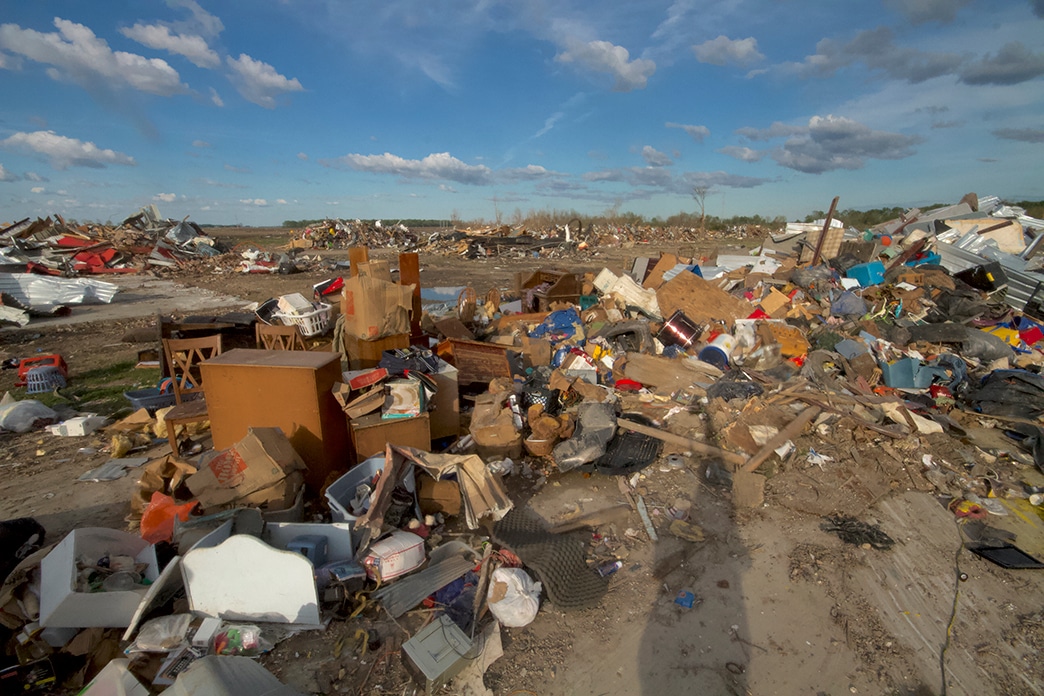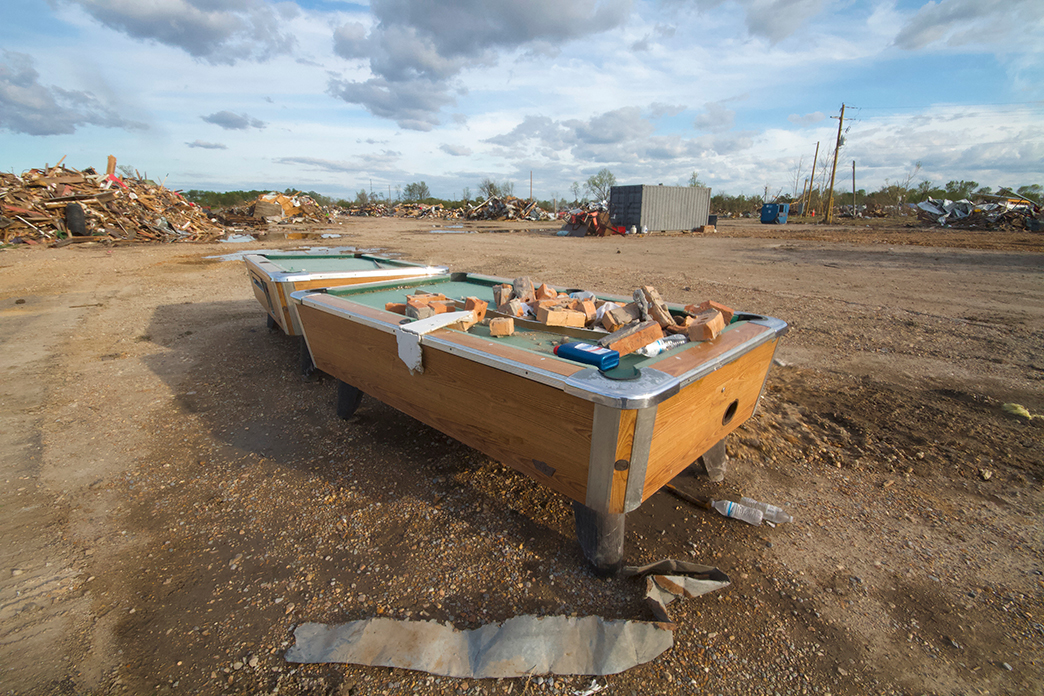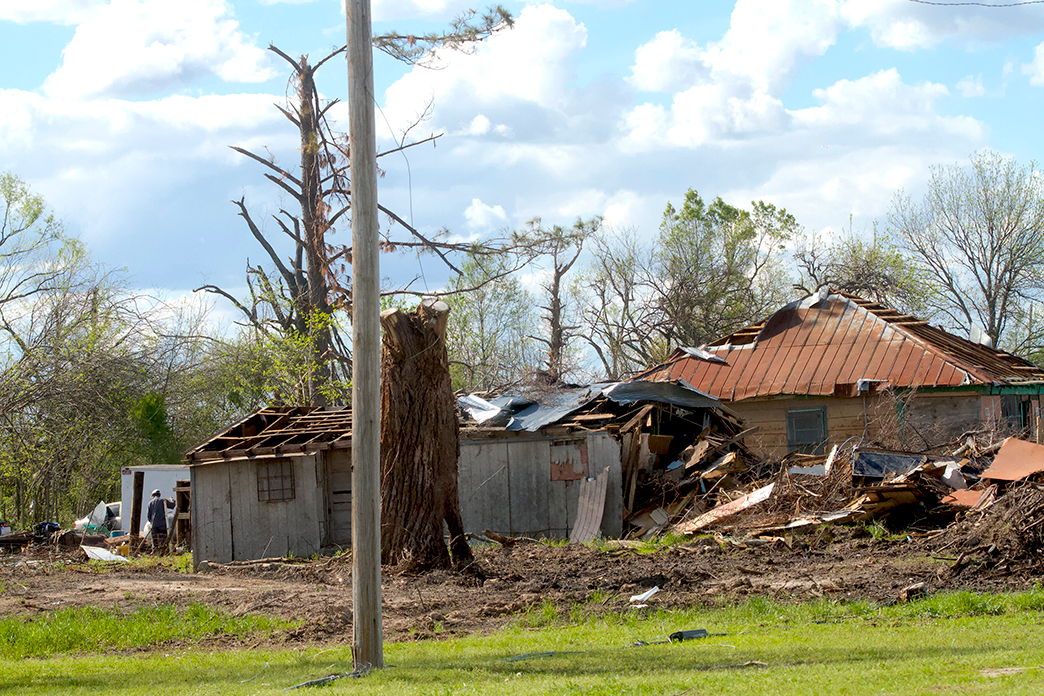Crisis and Resilience: SPLC’s Mississippi office works to help victims of devastating tornado
James Ray has been busy over the last couple of weeks.
The house on Front Street in Silver City, Mississippi, that his father left him 18 years ago is still a shambles. Pieces of tin roofing curl up toward the sky where the winds from an EF4 tornado tried to rip them from the joists. In many places the wind won, leaving the bare timbers open to the sky and the house defenseless against the elements.
On this particular day, just over two weeks after the March 24-25 tornado traced a path of destruction from nearby Rolling Fork through Silver City and across the Yazoo River, Ray is tearing down the remnants of a shed, the remaining two-by-fours of its walls nailed to two pilings standing upright about 6 feet out of the ground.
“I just keep working,” Ray said. “It’s got to get done.”
The unsaid part of that is “by me.” Although the destruction the tornado wreaked along the 170-mile path dominated media last month, the help needed to recover has been slow in arriving.
“These are the two poorest counties [Sharkey and Humphreys, where the bulk of the damage occurred] in the state of Mississippi, which is the poorest state in the country,” said Rob Gaudet, a site coordinator operating a recovery center in Rolling Fork for the nonprofit Cajun Navy relief organization. “So that makes these the poorest counties in the United States. It’s a real problem, and Americans aren’t paying attention to it.”
Waikinya Clanton, the Mississippi state office director for the Southern Poverty Law Center, said that is not a surprise.
“I think that is a common thing, right?” Clanton said. “The news cycle is predicated on the news of the day. Unfortunately, here in America we are subject to a number of different things. While we were working on the recovery in Rolling Fork, there was another tornado that cut across the South in Little Rock, Arkansas. Sometimes the attention does shift depending on what is happening in the world.”
Staffers from the SPLC’s Mississippi state office have been on the ground in the tornado-torn area since day one, helping to bring resources and support to the Delta region in the aftermath of the storm – including funding, supplies, organizational help and direct assistance to families and local governments in the tornado’s path.
An ongoing crisis
On this day, Red Cross volunteers and vehicles can be seen crisscrossing the streets in Rolling Fork, bringing water and aid to people who are trying to recover what they can and repair damaged homes. Contractors are hauling load after load of debris to dump sites, clearing away tons of fallen trees, bricks, lumber and other pieces of neighborhood homes crushed in the storm.
But the depth of the destruction is immense. Standing on U.S. Highway 61, which bifurcates the town, the debris field extends as far as the eye can see in every direction.
“That’s why it is so important to have local folks who won’t forget, who aren’t dictated off the news cycle,” Clanton said. “This is the third week that we’ve been out here. It’s been three weeks since the storm hit and we are still on the ground, we’re still present and we are still in the community. That’s why the work we do at the SPLC is so important – because people need to know they are seen and they are not forgotten about. And that people still care.”
The smell of burning tree limbs and diesel exhaust from the recovery efforts mixes with the musky odor of sweat and mildew from belongings still strewn across some of the concrete slabs where buildings once stood. People search through the wreckage of what used to be a self-storage facility, hoping against hope to find some of their belongings intact and bring a bit of normalcy to disrupted lives.
“We moved back here in 2003, so about 20 years,” said Joann Anderson, whose house off Lumbley Street was heavily damaged. “But my husband, he was born and raised here. We’ve never seen nothing like this.
“We were in the house, in the hallway. We got a warning on my phone, it was beeping and it went off. We usually get a warning from the city, but we didn’t get that. The phone warning said take shelter right away in the basement, but we don’t have no basement. So we just went in the hallway.”
As far as their future is concerned, Anderson said they were planning to rebuild.
“We’re trying to talk to a contractor to see what we can do,” she said.
In some ways, the Andersons are among the lucky ones. In addition to the 26 people killed in the storm, thousands were left homeless.
“You had close to 2,500 people lose everything they ever had,” Clanton said. “That, to me, is a different level of a clarion call and responsibility we have as people who are committed to being servant leaders.”
The SPLC’s effort has included helping to get the local government functioning.
“We’ve been doing a lot of work,” Clanton said. “We’ve provided technical assistance to the city of Rolling Fork to help improve their processes around communication such as helping to source media requests and set up a city website to help officials better communicate with victims of the storm so they can know where to get resources. We’ve helped to support the efforts of the Mississippi Rapid Response Coalition in the Rolling Fork area and we anticipate increasing our efforts in other places, like Silver City and Winona.”
Searching for memories
Behind the empty lot that used to be Chuck’s Dairy Bar on Highway 61, Edna Kent Jones is looking for pieces of her past.
“Let me know if you see any photos,” she called out to others helping look through the wreckage of a self-storage facility that was leveled.
Although the tornado took less than a minute to destroy the place where Jones had her belongings stored, the debris lingers far longer.
“It doesn’t go away real quick,” she said, musing philosophically.
This is not her first brush with Mother Nature’s fury, nor is it the first time she had an act of God strip away the material things in her life.
“I can remember the ’71 tornado that came through and got Delta City,” Jones said. “We all hid under the piano and that was the only room that was left, with us under the piano.”
After a bit more searching, she comes up with a candy dispenser in the shape of an M&M character. Grasping it, she continues to pore over the pile, looking for familiar items.
Clanton said her office’s efforts have been aimed specifically at the grassroots, helping people like Jones and Anderson get back on their feet.
“I’d say that we have helped hundreds of people so far,” Clanton said. “What we’ve done as a center is given $10,000 to the General Missionary Baptist State Convention, to help feed some of the families here in Rolling Fork. Edric Johnson from our team has personally gone out and fed families here. We’ve also given $5,000 to Mississippi Move to provide additional toiletries and resources for families. We’ve worked with coalitions and partnered with organizations like the International Black Women’s Public Policy Institute to provide supplies like boots, towels and toiletries for families; Women In Training, which is a youth organization out of Montgomery, Alabama, to provide feminine hygiene products to the women and girls in the area; and worked with the Mt. Able Missionary Baptist Church of Canton, Mississippi, to package and distribute bags.”
Even with the effort expended so far, Clanton realizes, like Jones, that this doesn’t go away fast.
“I think we have to keep telling the story,” she said. “I think that is a really big part of recovery. Recovery isn’t immediate. It is a long-term process. It is intricate. It goes further into the hearts and souls of a place. I think as long as there are people on the ground who are committed, that matters.”
‘A survival story’
About 30 miles away, back at James Ray’s house, the work goes on.
Across the front line of Ray’s lot, tree trunks and limbs are stacked, forming an 8-foot-high levee. He cut the smaller limbs himself, he said. He had help with the larger trunks, some nearly 3 feet in diameter.
“There was a crew working the apartments behind me, cutting over there,” Ray said. “They had a bigger saw, so they could cut the trunks up. They came over and helped.”
Ray said trucks were scheduled to come at the end of the week to pick up all the debris he had cleared so far.
“The tin from the roof and the branches were jammed up under the cars,” Ray said. “I couldn’t believe that. Just jammed under there solid.”
Next to Ray’s house, the unmistakable snout of a 1965 Ford Galaxie 500 poked out from under a tarpaulin. Unlike many of the vehicles that were in the tornado’s path, the old Detroit tin held together against the storm.
“It broke all the glass out of it,” Ray said. “I was driving it until they told me I couldn’t because it doesn’t have a windshield.”
Next to the Galaxie sat what was left of a late-model white Chevy Impala. Jagged metal reached upward from the rear deck where the roof had been ripped off, torn like the flap of an envelope holding an unwanted bill.
“That was my daughter’s car,” Ray said. “She’d come drive that one if her other one needed work.”
At the end of the drive, a temporary building that Ray constructed as a storage facility and workshop now serves as his home while the recovery and repair work continues. In what could be seen as the ultimate irony, the small portable structure survived the storm virtually unscathed.
“I’m living there while I fix the house,” he said. “It got a few dents from things blowing around, but that’s about it.”
Clanton said the people of the Mississippi Delta region, like Ray, just keep going no matter what adversity they face.
“Mississippi is a survivor’s story,” she said. “We’re one of the most resilient places on the planet. I have no doubt that the people of Rolling Fork and surrounding areas are going to build back better. That’s the story of people who don’t come from money. They know you have to take care of what you have, and unfortunately, like in this case, that also includes whatever you have left.
“That’s another part of the story of resilience.”
The SPLC's Mississippi state office is offering on-the-ground support to communities ravaged by a deadly tornado that struck in late March 2023. Pictured, from left: Edna Kent Jones, Kim Davadi and Patrick Green search for photos and other personal items in the rubble of a former self-storage facility in Rolling Fork, Mississippi, on April 10, 2023. (Credit: Dwayne Fatherree/SPLC)




